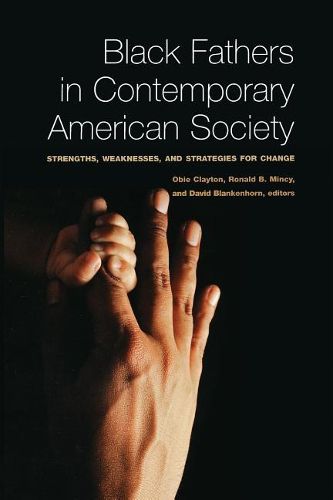Readings Newsletter
Become a Readings Member to make your shopping experience even easier.
Sign in or sign up for free!
You’re not far away from qualifying for FREE standard shipping within Australia
You’ve qualified for FREE standard shipping within Australia
The cart is loading…






The majority of African American children live in homes without their fathers, but the proportion of African American children living in intact, two-parent families has risen significantly since 1995. Black Fathers in Contemporary American Society looks at father absence from two sides, offering an in-depth analysis of how the absence of African American fathers affects their children, their relationships, and society as a whole, while countering the notion that father absence and family fragmentation within the African American community is inevitable. Editors Obie Clayton, Ronald B. Mincy, and David Blankenhorn lead a diverse group of contributors encompassing a range of disciplines and ideological perspectives who all agree that father absence among black families is one of the most pressing social problems today. In part I, the contributors offer possible explanations for the decline in marriage among African American families. William Julius Wilson believes that many men who live in the inner city no longer consider marriage an option because their limited economic prospects do not enable them to provide for a family. Part II considers marriage from an economic perspective, emphasizing that it is in part a wealth-producing institution. Maggie Gallagher points out that married people earn, invest, and save more than single people, and that when marriage rates are low in a community, it is the children who suffer most. In part III, the contributors discuss policies to reduce absentee fatherhood. Wornie Reed demonstrates how public health interventions, such as personal development workshops and work-related skill-building services, can be used to address the causes of fatherlessness. Wade Horn illustrates the positive results achieved by fatherhood programs, especially when held early in a man’s life. In the last chapter, Enola Aird notes that from 1995 to 2000, the proportion of African American children living in two-parent, married couple homes rose from 34.8 to 38.9 percent; a significant increase indicating the possible reversal of the long-term shift toward black family fragmentation. Black Fathers in Contemporary American Society provides an in-depth look at a problem affecting millions of children while offering proof that the trend of father absence is not irrevocable.
$9.00 standard shipping within Australia
FREE standard shipping within Australia for orders over $100.00
Express & International shipping calculated at checkout
The majority of African American children live in homes without their fathers, but the proportion of African American children living in intact, two-parent families has risen significantly since 1995. Black Fathers in Contemporary American Society looks at father absence from two sides, offering an in-depth analysis of how the absence of African American fathers affects their children, their relationships, and society as a whole, while countering the notion that father absence and family fragmentation within the African American community is inevitable. Editors Obie Clayton, Ronald B. Mincy, and David Blankenhorn lead a diverse group of contributors encompassing a range of disciplines and ideological perspectives who all agree that father absence among black families is one of the most pressing social problems today. In part I, the contributors offer possible explanations for the decline in marriage among African American families. William Julius Wilson believes that many men who live in the inner city no longer consider marriage an option because their limited economic prospects do not enable them to provide for a family. Part II considers marriage from an economic perspective, emphasizing that it is in part a wealth-producing institution. Maggie Gallagher points out that married people earn, invest, and save more than single people, and that when marriage rates are low in a community, it is the children who suffer most. In part III, the contributors discuss policies to reduce absentee fatherhood. Wornie Reed demonstrates how public health interventions, such as personal development workshops and work-related skill-building services, can be used to address the causes of fatherlessness. Wade Horn illustrates the positive results achieved by fatherhood programs, especially when held early in a man’s life. In the last chapter, Enola Aird notes that from 1995 to 2000, the proportion of African American children living in two-parent, married couple homes rose from 34.8 to 38.9 percent; a significant increase indicating the possible reversal of the long-term shift toward black family fragmentation. Black Fathers in Contemporary American Society provides an in-depth look at a problem affecting millions of children while offering proof that the trend of father absence is not irrevocable.